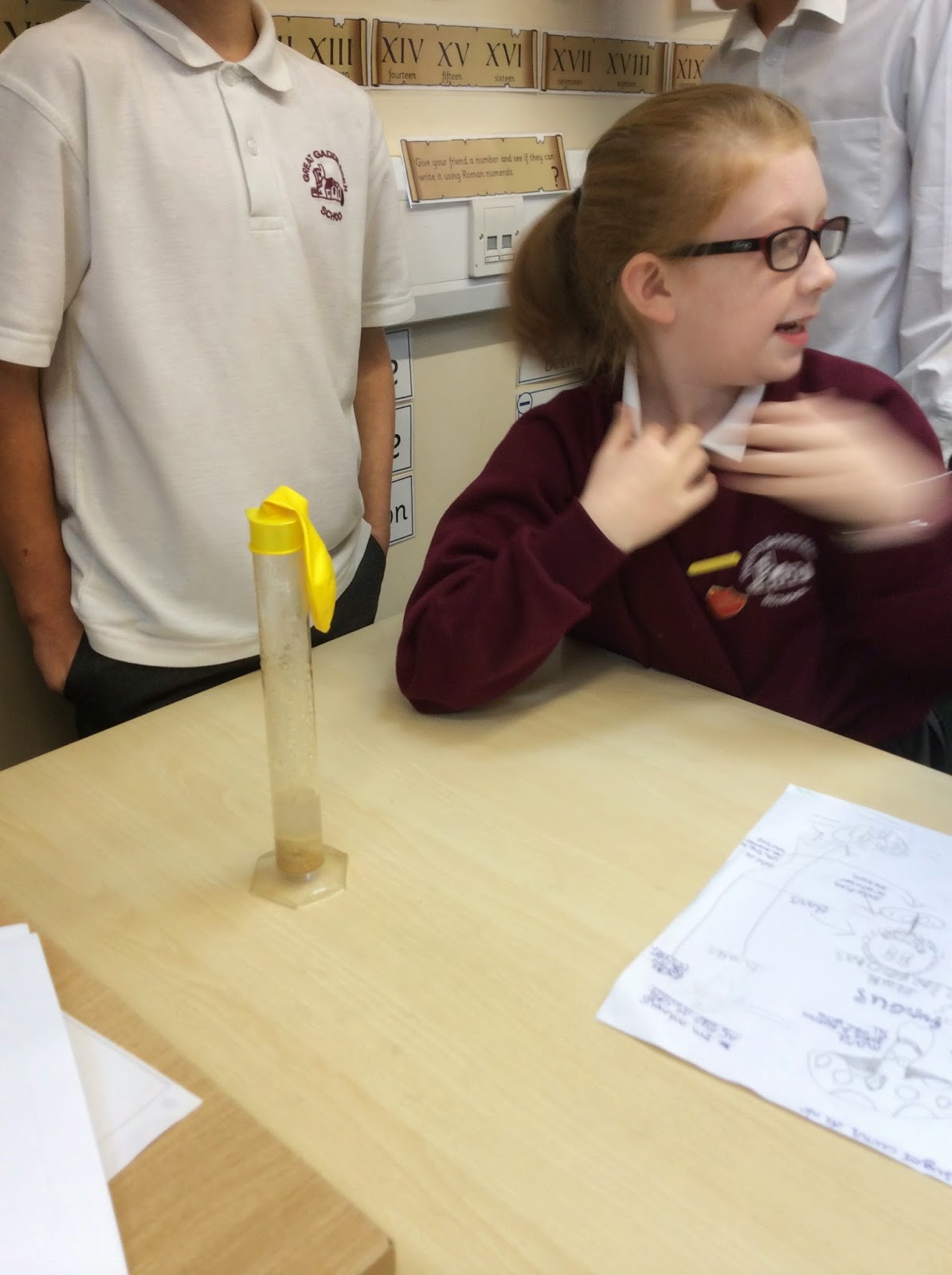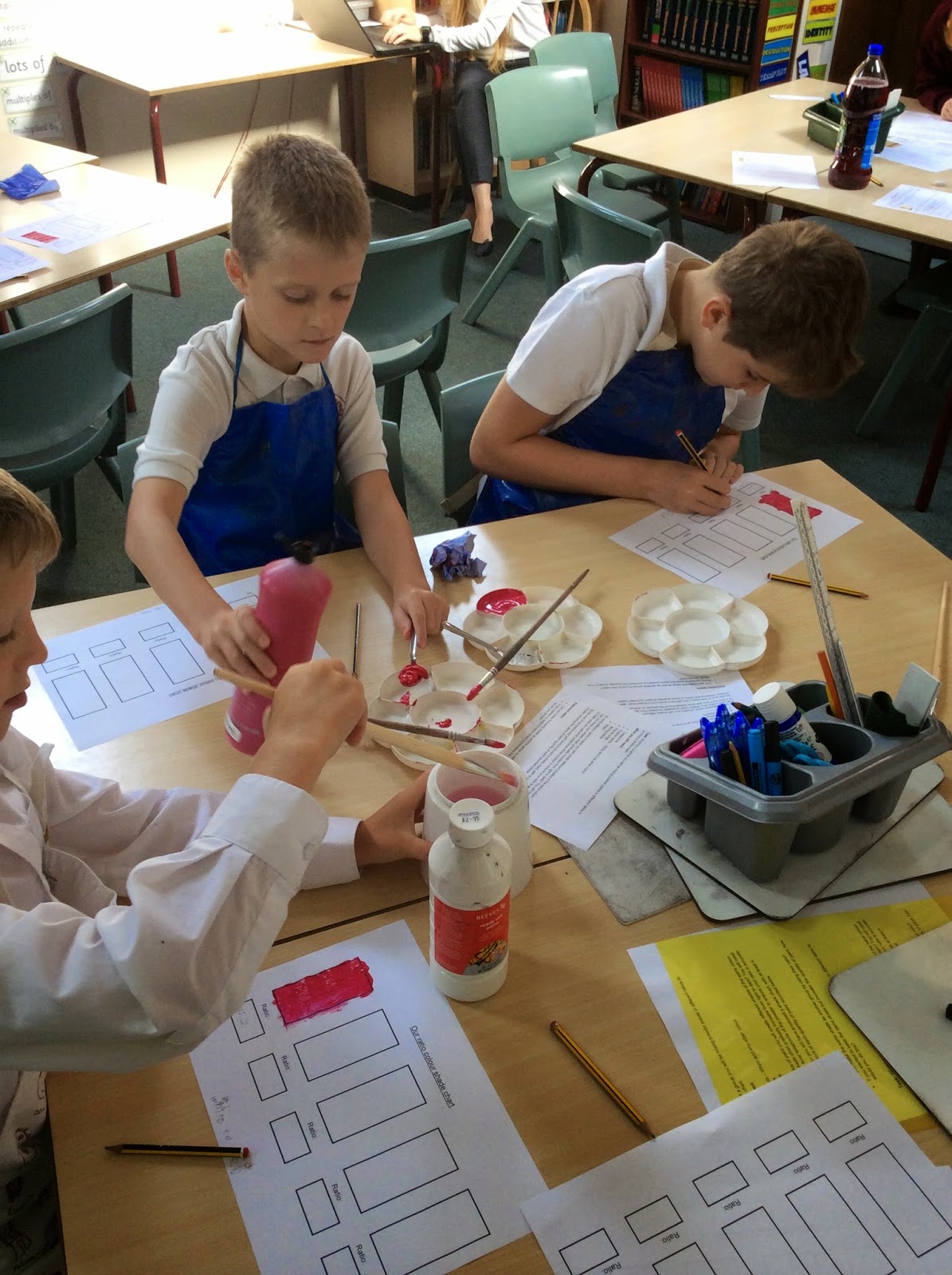This week, Harry, Beau, Max and Ollie went to a 2000m cross country event at Cavendish School. The worse part of it was the weather, the best part was that Ollie came 9th, Beau came 15th Max came 16th and Harry came 25th. There were over 70 children in each race.
Thursday 23 October 2014
Wednesday 22 October 2014
Maths-word problems
Today in maths we were coming up with word problems. Each table group created their own word problem and the rest of the class had to try and solve it; we got one that we thought should be a GCSE question because it was so difficult. Despite the hard work, Callum managed to solve the question - however, everyone persevered and didn't give up, we were desperate to come up with the answer. This is the question, without a calculator can you get back to us with the answer?
Friday 17 October 2014
Mrs comer's maths question
At maths club on Wednesday Mrs Comer set us all a challenge, it was: what number has exactly 36 factors? The prize was five house points!! We could use a calculator, but we couldn't look on the internet. We all tried to find the number but we couldn't yesterday. I found out that 3330 had 24 factors so I doubled it which gave me 6660 so I worked on it and then it gave me 36 factors.
Willow O'Neill
Willow O'Neill
Wednesday 15 October 2014
Science experiement
Further to setting up our compost bin, we also carried out an investigation that we monitored and observed every 5mins.
We split into two groups to organise the experiment - one group were given yeast, sugar and warm water and the other group were given talc, sugar and warm water. We carefully measured out our ingredients and placed them in a tube - we then covered the tubes with balloons. We drew diagrams every 5mins to show what was happening to the two tubes. Look at our pictures below to see our findings.
Which tube do you think had the yeast in? Why? Comment and let us know what you think and why.
We split into two groups to organise the experiment - one group were given yeast, sugar and warm water and the other group were given talc, sugar and warm water. We carefully measured out our ingredients and placed them in a tube - we then covered the tubes with balloons. We drew diagrams every 5mins to show what was happening to the two tubes. Look at our pictures below to see our findings.
Which tube do you think had the yeast in? Why? Comment and let us know what you think and why.
Science - observing over time
Today in science we have been really busy! We have set up an investigation where we will be observing over time. We have gathered ingredients such as: egg shells, an egg box, broccoli, paper towels, newspaper, dill, teabags, a banana, banana skin and mushrooms. We have taken a picture that you can see below. We then poured water in and covered the top with netting. Next week we will observe our compost bin to see if there are any changes.
We made predictions about what we believe will decompose and what ingredients won't.We think: the fruit and vegetables, egg box and newspaper will decompose and the rest will not. We will update our blog to let you know our findings overtime.
We made predictions about what we believe will decompose and what ingredients won't.We think: the fruit and vegetables, egg box and newspaper will decompose and the rest will not. We will update our blog to let you know our findings overtime.
Tuesday 14 October 2014
French
Today in French, we learned how to describe our personalities as well as other people's. We learned that if we're talking about a female, some of the letters change for example, spotif for masculine (male) and sportive for feminine (female). At the end of the lesson, we described our brother, sister or cousin using our knowledge of what we learnt in previous lessons; such as: eyes (les yeux), hair (les cheveux), name and age.
Here is an example below.
Here is an example below.
WW1 Poem Recital
In English, we were practising and reciting a poem called The Call.It is about the first world war, some people got into groups, and others worked independently. In yesterdays lesson we practised saying it, without the words in front of us.Today we performed it in front of the class. We paired u , and did a practice video.
After that, our partners looked at the video and peer assessed us.
Then we were videoed by our teacher (Miss Williams). We had lots of fun! We learned how to include lots of expression in our voices and that it's hard to remember the poem without the words.
After that, our partners looked at the video and peer assessed us.
Friday 10 October 2014
In the trenches
Our task today was to write a poem about WWI and life in the trenches. Before we could write our poem we needed to know how it would feel to be in the trenches. In order to experience this we created a trench in the classroom and listened to sound effects. We then came up with ideas about the conditions in the trenches, using the 5 senses we came up with: hearing sounds of the wounded, the feeling of being cramped and the smell.
In our poems we needed to include different literary devices such as: metaphor, similes, alliteration, repetition, onomatopoeia, rhyme.
In our poems we needed to include different literary devices such as: metaphor, similes, alliteration, repetition, onomatopoeia, rhyme.
Ratio
Today we learned that ratio can be used in practical ways such as: cooking, building, making squash and mixing shades of colours. We can simplify ratio for example: 3:9 = 1:3
Each of the numbers represents a part so 1:3 means there are 4 parts in total.
We were making squash so if the ratio was water to squash - 11:3 you would need 11 parts water and 3 parts squash. You cannot write the ratio 3:11 because you'll end up with 3 parts water and 11 parts squash - making the wrong consistency.
Here are some pictures of what we did today:
Each of the numbers represents a part so 1:3 means there are 4 parts in total.
We were making squash so if the ratio was water to squash - 11:3 you would need 11 parts water and 3 parts squash. You cannot write the ratio 3:11 because you'll end up with 3 parts water and 11 parts squash - making the wrong consistency.
Here are some pictures of what we did today:
Monday 6 October 2014
Dance
Today in Mr Bull's P.E lesson, we were focusing on Ancient Greek Olympics. We were performing entrances, boxing sequences and sword fight routines in pairs. We needed to include:
- Facial expressions - show emotion
- Reactions that were in time with the actions
- Accurate timing, correct to the music.
Thursday 2 October 2014
Our school visit from Mike Penning
Today we had a visit from Mike Penning, our local MP, he spoke to us about his life, family and his job.
We discovered that he is a SPURS fan!!! Also, that he has a license to drive a tank. Some of his previous jobs were a fireman, policeman and a journalist. One of his two daughters lives in Australia as a Marine Biologist, his other daughter is a teacher at Galley Hill School.
Our School Council recently had a visit to the Houses of Parliament, unfortunately Mr Penning was not there, we found out today that he was in Washington D.C!
During his visit this morning, we asked Mike a range of questions:
We discovered that he is a SPURS fan!!! Also, that he has a license to drive a tank. Some of his previous jobs were a fireman, policeman and a journalist. One of his two daughters lives in Australia as a Marine Biologist, his other daughter is a teacher at Galley Hill School.
Our School Council recently had a visit to the Houses of Parliament, unfortunately Mr Penning was not there, we found out today that he was in Washington D.C!
During his visit this morning, we asked Mike a range of questions:
- When was the Houses of Parliament built?
- How do you raise money to keep the Houses of Parliament running?
- How many parties are there?
- As an MP, how do you feel about troops being sent to war?
On behalf of Great Gaddesden School we would like to say a great big thank you to our local MP, Mike Penning, for coming in to speak with us today.
Subscribe to:
Posts (Atom)























